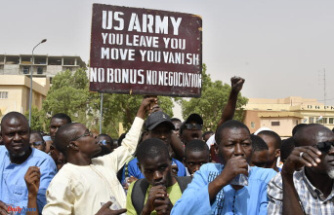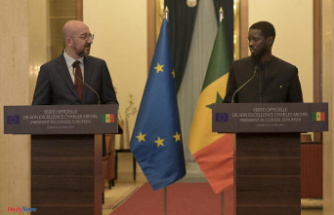LOUISVILLE (Ky.) -- Tuesday saw the start of juror selection. This was the first questioning of potential jurors in the trial of a former Kentucky officer who was involved in the raid that resulted in the death of Breonna Taylor.
In Brett Hankison’s wanton-endangerment trial, prospective jurors are being interviewed individually so that lawyers can determine if they have preexisting biases.
Taylor was killed in a botched 2020 drug raid. Hankison has not been charged with Taylor's death. However, Hankison was charged with firing shots during the raid into an apartment neighboring and putting others at risk.
First prospective juror was called by a Black woman, a medical worker like Taylor. She said that she was neutral on the case. Lawyers asked her if she knew Hankison's case was separate from Taylor's shooting death. The woman stated that Taylor's death was not her concern and she would consider Hankison's evidence. She was retained and asked to come back on February 22nd for the next stage of jury selection.
Two additional jurors were also dismissed from the first group. One of the young men said that he was a disbeliever in police and did not want to serve on the jury. One of the other women, a white woman, stated that she believed Hankison guilty in Taylor's murder.
Thirteen potential jurors were interviewed at mid-afternoon. Seven, which included the Black medical worker, and four white men were retained for the next stage.
Due to the heavy media coverage surrounding Taylor's passing and the racial injustice protests in Louisville, Kentucky throughout 2020, the jury pool was increased to 250. Prospective jurors will be questioned individually, approximately 20 per day, in order to determine if they are unable to be impartial on Hankison's guilt. This process could take several weeks.
On Tuesday, potential jurors had a wide range of opinions. One young Black woman claimed she was a part of a protest against Taylor's death in 2020, but that she would be able judge Hankison's case objectively.
The woman said Taylor was not a criminal and that the police did not have any reason to pursue her. She was then dismissed. Another young woman was fired after she looked at news reports regarding the case, even though the judge had asked her not to. Others were fired because they had scheduling conflicts or were biased about the case.
Last week's scheduled start of questioning was delayed due to inclement weather. Hankison also needed minor surgery.
Hankison, who wore a bright pink tie and a blue suit, sat with his lawyers during Tuesday's proceedings.
Taylor was not injured by bullets fired by Hankison's two other officers. Taylor's boyfriend shot a bullet that hit Jonathan Mattingly in the leg. Kenneth Walker, Taylor's boyfriend, stated that he was afraid of an intruder breaking into Taylor’s apartment on the ground floor.
Taylor, a 26 year-old Black woman working as an emergency medical technician was shot several times. Her apartment was not found with drugs and the warrant that allowed her to enter by force was later deemed invalid. This case also shed light on the issue of "no knock" warrants which were later banned from Louisville.
Hankison pleaded not guilty three counts of first degree wanton endangerment. This low-level crime carries a sentence of one to five year in prison.
Hankison requested that Ann Bailey Smith, Jefferson Circuit Judge, deny her request to move the trial from Louisville last year. Hankison had claimed that the publicity surrounding the case would make a difficult task of securing an impartial jury.












